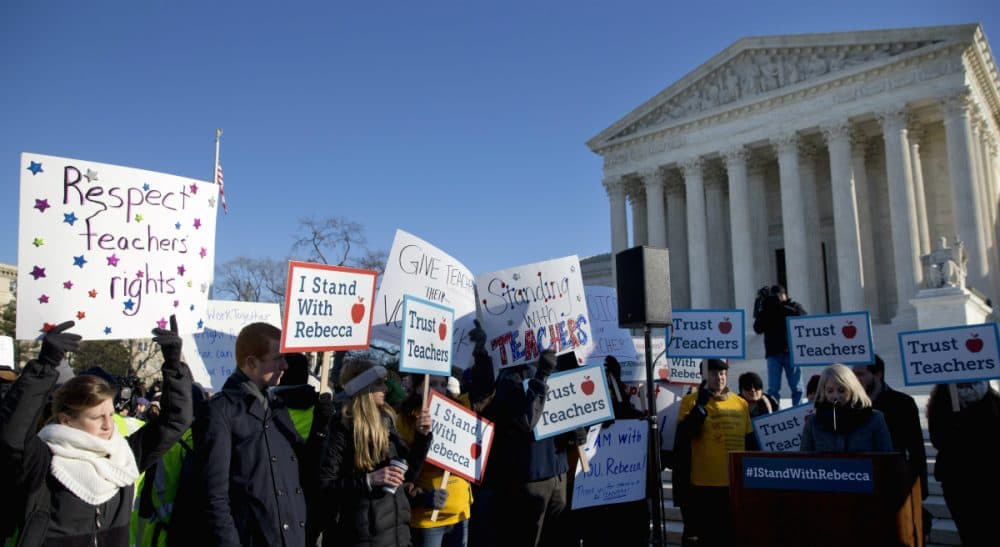Advertisement
The Conservative Case For Unions

The death of Justice Antonin Scalia snatched victory from the jaws of defeat for American unions last week. By a 4-4 tie, the Supreme Court upheld public sector unions’ right to dun non-members for fees. Minus Scalia’s expected anti-union vote, organized labor notched a rare win.
The high court’s action, or inaction, was welcome. The union in this case, the California Teachers Association, argued that the better wages and benefits it secures through collective bargaining go to non-members as well as dues-paying joiners. To tweak an Americanism, anti-union forces wanted representation without taxation, better known as mooching. Paying for what you get ought to be a conservative value. And that’s just the start of the conservative case for unions, particularly in the private sector.
Paying for what you get ought to be a conservative value.
The plunge in unionization, from almost 40 percent of private sector workers in the 1950s to 7 percent today, accounts for up to a third of the chasm between our haves and have-nots. (De-unionization has been less pronounced in the public sector.) Unions negotiating wages and benefits with their employers would be one free-market solution to inequality, lessening the need for government action.
“Big-business Republicans have sometimes behaved as if unions have no legitimate economic reason to exist — when, in reality, unions wind up being the only way industrial workers can bargain effectively with the massive corporations that employ them,” wrote James Poulos of The Daily Beast. “Unions exist because, without them, the path is opened wide to crony collaboration between big government and big business. That’s the fundamental insight behind a conservative case for unions. Without the balancing effect of organized labor, corporations can easily threaten political liberty by creating an economic system in which millions of citizens are effectively locked into servile, dependent labor relations.”
If experience is the best teacher — and any levelheaded conservative should privilege it over theoretical, blackboard blah blah — then history backs unions as well. Other nations, including Canada, which tends to mirror U.S. economic developments, remain more unionized and less unequal than we.
Reviving unions would be no easy task, but keep in mind that their unmaking was largely due to deliberate policy. Voters could lean on their state and federal representatives to reverse that policy, starting with areas in which U.S. labor law diverges from Canada’s. Those include state “right to work” laws allowing non-union workers to forego dues while benefiting from collective bargaining. (While unions also use dues for political activities with which individual members may disagree, government workers typically receive refunds for that portion of their dues.) Twenty-six states have gone the right-to-work route, goaded by conservatives who say, with some evidence, that right-to-work states have more manufacturing jobs.
But another, labor-supported study found that jobs in those right-to-work states paid lower wages and benefits. As poor-paying employment is a contributor to inequality along with unemployment, right to work seems a better deal for shareholders than the average worker. Indeed, some Missouri Republican lawmakers opposed a right-to-work bill in that state last year, arguing that unions benefit employers by providing a trained workforce.
Other obstacles in U.S. law include a needlessly cumbersome process for forming a union, compared to Canada’s. That country also cracks down on illegal union-blocking by employers faster. And in the first contract negotiation after a union is formed, Canadian law breaks any impasse, if necessary, with an arbiter-imposed deal—a looming kick in the pants to both sides to reach an agreement on their own.
Efforts to incorporate such measures into U.S. law stumbled early in the Obama Administration. And to be sure, unions have their downsides: Just ask school administrators who’ve tried to implement innovative teaching strategies or get rid of classroom incompetents in the face of union primitivism.
Unions negotiating wages and benefits with their employers would be one free-market solution to inequality, lessening the need for government action.
Yet the first Republican president sympathized with labor. Abraham Lincoln, in his 1861 annual address to Congress, sounded positively Bernie Sanders-ish: “Labor is prior to and independent of capital. Capital is only the fruit of labor, and could never have existed if labor had not first existed. Labor is the superior of capital, and deserves much the higher consideration.” Lincoln also supported the right of workers to strike.
Honest Abe was no business hater; he’d been a corporate lawyer for railroads. He simply believed in Americans’ “right to rise” from humble circumstances. Years later, the Gilded Age demonstrated that Americans won’t tolerate being run roughshod over forever. One positive from Donald Trump’s ugly campaign has been his stomping on Republican indifference to workers — by advocating universal health care and entitlements — without repercussions from the white male voters who are his and the party’s base. GOP leaders should wake up to reality by tearing the anti-union page from their hymnal.
